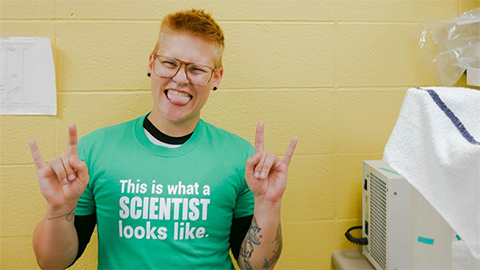Advocate spotlight: T.L. Jordan, advocate for LGBTQ inclusion in academia
My name is T.L. Jordan, and I am a scientist and an advocate. My journey started one year ago, as a first-year immunology Ph.D student at the Mayo Clinic. It was also the same time I came out publicly as nonbinary, identifying as neither male nor female, but elsewhere on the gender spectrum.
 T.L. Jordan
T.L. Jordan
I realized as soon as I came out that my institution did not have many policies to make my transition comfortable. Because I go by they/them, the policy language for certain benefits like parental leave were so gendered that I technically didn’t qualify for them unless I misgendered myself. From that moment, I started putting my efforts toward creating a comfortable place in academia for LGBTQ folx (folx is an inclusive way to address all genders in LGBTQ).
It certainly hasn’t been easy. I have received pushback from administrators, students and professors on my projects that push for LGBTQ inclusivity. When I asked faculty to be mindful about assuming pronouns, I was told by some that remembering pronouns was too difficult. When expressing my interest to host in-person trainings to discuss LGBTQ issues, I was told that online modules were good enough.
After working through the negative perspectives, I founded the Gender and Sexuality Literacy Training program and have given trainings on pronoun usage at faculty meetings. These presentations encourage faculty to be considerate of individuals with different pronouns than those assigned to them at birth. Faculty are encouraged to remove gender identifiers from their communications and syllabuses and ask all students for their pronouns, thereby normalizing the process. These actions have a profound impact on individuals who usually feel ostracized by continuously having to state their pronouns. Faculty members are also starting to identify their own pronoun preferences in their email correspondences. The success of the program so far has led to the possibility of other Mayo Clinic departments implementing this training.
I feel a great sense of pride about the work I have done, but I also sometimes feel isolated. I realized early in graduate school that I wanted to explore science communication, accessibility, and advocacy. I was the odd one out, as most of my peers want to stay in academia or industry. There were even faculty members who thought my career goals were “a waste of a Ph.D.”
Luckily, my mentor, Marina Ramirez-Alvarado, a member of the ASBMB’s Public Affairs Advisory Committee, is incredibly supportive of my desire to advocate for the LGBTQ community. She has helped me find LGBTQ STEM conferences where I can present my research and meet peers with similar advocacy goals.
By connecting with professors and peers who support my work, fighting for LGBTQ-friendly policies and programs become easier. I am excited to continue to pursue advocacy, especially knowing the amount that I have accomplished in only one year. I am proud to be an advocate for my LGBTQ family in science.
Enjoy reading ASBMB Today?
Become a member to receive the print edition four times a year and the digital edition monthly.
Learn moreGet the latest from ASBMB Today
Enter your email address, and we’ll send you a weekly email with recent articles, interviews and more.
Latest in Policy
Policy highlights or most popular articles

Women’s health cannot leave rare diseases behind
A physician living with lymphangioleiomyomatosis and a basic scientist explain why patient-driven, trial-ready research is essential to turning momentum into meaningful progress.

Building a stronger future for research funding
Hear from Eric Gascho of the Coalition for Health Funding about federal public health investments, the value of collaboration and how scientists can help shape the future of research funding.

Councilors advocate for science on Capitol Hill
ASBMB Councilors meet with their elected officials to advocate for basic scientific research funding and training the next generation of scientists.

Hope for a cure hangs on research
Amid drastic proposed cuts to biomedical research, rare disease families like Hailey Adkisson’s fight for survival and hope. Without funding, science can’t “catch up” to help the patients who need it most.

Supporting science through advocacy and community building
ASBMB calls on scientists to take action as funding cuts and policy shifts threaten the U.S. research enterprise, emphasizing the power of community advocacy and persistence in protecting the future of science.

Seven steps to advocating in your home state
Find out how to schedule, prepare for and conduct a productive district office meeting to communicate the importance of fundamental scientific research funding to your representatives.

